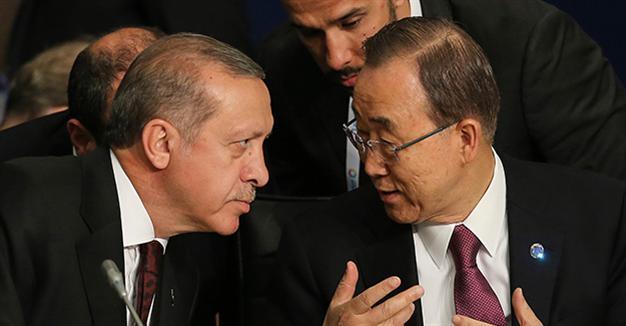Ankara refutes Russian claims of supplying ISIL with explosives
UNITED NATIONS / ANKARA

United Nations Secretary General Ban Ki-moon, right, talks through an interpreter to Turkey's President Recep Tayyip Erdoğan, left, prior to a roundtable meeting on "Political Leadership to Prevent and End Conflicts" at the World Humanitarian Summit in Istanbul, Monday, May 23, 2016 - AP photo
Ankara has refuted claims by Russia that Turkey is supplying the Islamic State of Iraq and the Levant (ISIL) with components for improvised explosive devices.A spokesperson for the Turkish Foreign Ministry said the claims were “propaganda material” and could not be taken seriously.
The spokesman called the letter “the most recent example of Russia’s propaganda campaign against Turkey, and as such it cannot be taken seriously,” according to the Associated Press.
Russian Ambassador to the U.N. Vitaly Churkin had said in a letter to U.N. Secretary-General Ban Ki-moon circulated on May 26 that the devices “are being widely used to commit terrorist acts.”
He said an analysis of chemical components of explosives captured from Islamists in the region of the Iraqi city of Tikrit and the Syrian city of Kobane, and a review of conditions for selling the components, “indicates that they were either manufactured in Turkey or delivered to that country without the right of re-export.”
Churkin accused five Turkish companies of delivering aluminum powder, ammonium nitrate, hydrogen peroxide and other material produced by various Turkish and foreign companies to ISIL.
Russia, a key ally of Syrian President Bashar al-Assad, and Turkey, a major backer of the Syrian opposition, have been at odds during the five-year conflict. Tensions escalated following Turkey’s downing of a Russian warplane near its border with Syria last November over airspace violations.
Russia retaliated by deploying long-range air defense missile systems to its base in Syria and imposed economic sanctions on Turkey.
Russia had formerly accused Ankara of allowing terrorists to earn money by selling oil stolen from Syria.
Churkin said one notable feature of the explosive devices assembled by ISIL militants was the use of parts manufactured by U.S., Swiss and Swedish companies.
He said “detonation cords manufactured in third countries have been illegally resold through Turkey to ISIL fighters.”
“These facts demonstrate that the Turkish authorities are deliberately involved in ISIL activity, as they are providing access to components for improvised explosive devices that are being widely used to commit terrorist acts,” Churkin added.
















